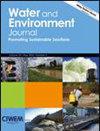Unravelling Chinese industrial structure optimisation paths within Regional Comprehensive Economic Partnership considering the virtual trade of water and water pollutants
IF 1.8
4区 环境科学与生态学
Q4 ENVIRONMENTAL SCIENCES
引用次数: 0
Abstract
Massive commodity transactions lead to enormous virtual water and water pollution transfer; this phenomenon will be intensified within the process of Regional Comprehensive Economic Partnership (RCEP) enforcement. This study applied multi‐regional input–output and scenario simulation approach to reveal the virtual water elements flow, while exploring the trade structure optimisation roadmap for China. Results unveiled that China was a virtual water net exporter (9.17 billion tons), also the largest importer of water pollutants (N 622456 tons and P 136110 tons) among RCEP countries in 2015. In order to alleviate the water pressure in China, the textiles and other manufacturing industries should be limited, while the service industry is encouraged. Optimal scenario can realize 29.8% water conservation and 8% water pollutants reduction and also achieve a 36.5 million dollars trade volume increase. This research improves trade‐off balance between water environment and economy at multi‐regional level and accelerates green trade in economic partnerships globally.

基于水与水污染物虚拟贸易的区域全面经济伙伴关系框架下中国产业结构优化路径研究
本文章由计算机程序翻译,如有差异,请以英文原文为准。
求助全文
约1分钟内获得全文
求助全文
来源期刊

Water and Environment Journal
环境科学-湖沼学
CiteScore
4.80
自引率
0.00%
发文量
67
审稿时长
18-36 weeks
期刊介绍:
Water and Environment Journal is an internationally recognised peer reviewed Journal for the dissemination of innovations and solutions focussed on enhancing water management best practice. Water and Environment Journal is available to over 12,000 institutions with a further 7,000 copies physically distributed to the Chartered Institution of Water and Environmental Management (CIWEM) membership, comprised of environment sector professionals based across the value chain (utilities, consultancy, technology suppliers, regulators, government and NGOs). As such, the journal provides a conduit between academics and practitioners. We therefore particularly encourage contributions focussed at the interface between academia and industry, which deliver industrially impactful applied research underpinned by scientific evidence. We are keen to attract papers on a broad range of subjects including:
-Water and wastewater treatment for agricultural, municipal and industrial applications
-Sludge treatment including processing, storage and management
-Water recycling
-Urban and stormwater management
-Integrated water management strategies
-Water infrastructure and distribution
-Climate change mitigation including management of impacts on agriculture, urban areas and infrastructure
 求助内容:
求助内容: 应助结果提醒方式:
应助结果提醒方式:


